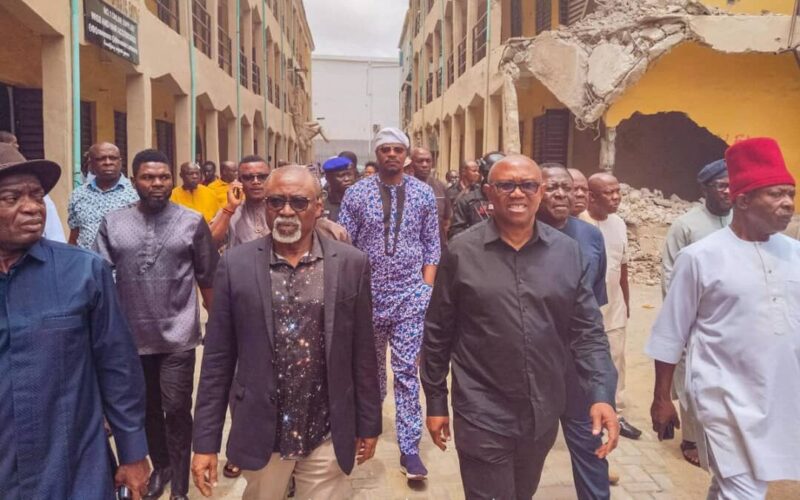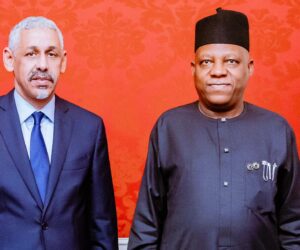The Lagos State Government has rejected claims by former presidential candidate Peter Obi that traders at the Trade Fair Complex in Ojo were unfairly treated during last week’s demolition of over 19 buildings.
In a statement on Wednesday, the Commissioner for Information and Strategy, Gbenga Omotoso, said Mr Obi misrepresented the facts.
He stressed that approvals for physical development can only be issued by the Lagos State Government, not the Trade Fair Management Board.
Mr Omotoso also alleged that ministry officials were attacked during inspections, prompting police intervention.
“He launched into emotional theatrics, describing the incident as a ‘test of impunity, justice and compassion’—all in an effort to mislead the public. This is unfair,” Mr Omotoso said.
He clarified the sequence of events: “The owners of the buildings had no state approval. They were given ample time to regularize their papers during a general amnesty declared last year, which was extended several times. They shunned the offer. When Physical Planning officials visited the complex, the gates were locked against them, and they were physically attacked. The police had to rescue them. When the government invited the owners for talks, they refused to attend.
“Their defence is that the Trade Fair Management Board permitted them to build their structures. This is incorrect. The Board, a federal creation, manages leases and commercial activities but does not have the power to approve building developments. Under the Nigerian Urban and Regional Planning Act (1992), as domesticated by Lagos State law, all physical development in Lagos requires planning permits from the state government.
“This position was reinforced by the 2003 Supreme Court judgment in Attorney-General of Lagos State v. Attorney-General of the Federation, which affirmed that states retain authority to regulate development control within their territories, including on federal land, except for core federal areas such as military formations.
“In other words, administrative consent from the Management Board is not enough; state approval is mandatory. We must decide whether we want a society governed by law or one run by emotions and political interests.”
The statement came after Mr Obi visited the Trade Fair Complex on Tuesday, condemning the demolitions as “a test of impunity, justice and compassion.”
He was accompanied by lawmakers and Labour Party officials.
In his statement on Tuesday, Mr Obi said traders had obtained necessary approvals before their structures were pulled down.
He commended them for their restraint and urged government at all levels to act with fairness and compassion, warning that destroying legitimate investments without due process is both unjust and economically harmful.
“Many of the affected traders invested heavily—often through loans—to secure their livelihoods and contribute to the economy. A society seeking progress must protect enterprise, encourage productivity, and defend citizens’ dignity. Incidents like this should have no place in a nation aspiring to fairness and stability,” Mr Obi said.
Traders, however, described the demolitions as sudden and without prior notice. An eyewitness, Ikenna, told The Punch that the operation started around 8 a.m., with police on site, but no notice to vacate or court order was issued.
Another trader, Stephen, said one demolished structure had federal clearance and questioned why the state did not issue a notice.
An engineer supervising one of the buildings, Samuel, criticised the execution, saying buildings were marked for demolition the same morning the operation began.

The demolitions, carried out last Thursday by the Lagos State Building Control Agency, Physical Planning Permit Authority, and Urban Renewal Agency, were accompanied by armed security personnel.
The state said the affected structures were unapproved, structurally defective, or built on road setbacks and drainage alignments.
PREMIUM TIMES reported that the Commissioner for Physical Planning and Urban Development, Oluyinka Olumide, said that the demolitions were backed by the 2003 Supreme Court judgment and the Lagos State Urban and Regional Planning and Development Law 2019 (as amended).
He emphasised that even though the complex sits on federal land, developers must still obtain state permits and comply with Lagos’ planning laws.
“We acted to stop the development of unapproved and unsafe buildings in the complex. Since November 2023, developers were repeatedly urged to regularize their building approvals, but many failed to do so,” Mr Olumide said.










